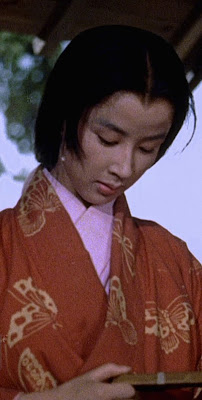Monday, 17 September 2012
THE SAMURAI TRILOGY Samurai I: Musashi Miyamoto Reviewed By Greg Klymkiw Criterion Collection Blu-Ray Box
Samurai I: Musashi Miyamoto (1954) *****
dir. Hiroshi Inagaki
Starring: Toshiro Mifune, Rentaro Mikuni, Kaoru Yachigusa, Mariko Okada, Mitsuko Mito, Kuroemon Onoe
Review By Greg Klymkiw
Young men dream of going to war. I know I did. Then I read Stephen Crane's "The Red Badge of Courage" and Erich Maria Remarque's "All Quiet on the Western Front" and put that thought to rest mighty quick (in spite of my Sands of Iwo Jima John Wayne fetish).
Alas, the same cannot be said for young men living deep in the sleepy provinces of seventeenth-century Japan - especially not the devil-may-care orphan Takezo (Toshiro Mifune) who is perched up in a tree with his equally restless, though somewhat more rooted pal Matahachi (Rentaro Mikuni). They both gaze with equal dreams of glory upon their village and the picturesque countryside as a huge army assembles to go into battle.
Nothing is ultimately stopping the brash, Takezo, but Matahachi has ties that indeed bind him with his betrothal to the most desirable catch in their village - the kind, sexy and radiantly beautiful Otsu (Kaoru Yachigusa). Though he admits a ready willingness to join his lusty pal on the battlefield, it's Takezo who reminds his chum, with a mixture of benevolence and braggadocious bravado, that some men have commitments that must keep them behind. This, of course, inspires Matahachi to do the unthinkable and abandon all that is sacred. Takezo does what he was born to do, but Matahachi let's macho pride rule his decisions and a terrible price will eventually be paid for this.
So then begins Musashi Miyamoto, a tale of two friends who begin together on the same path, but eventually take separate forks in the road of life which results in a series of surprises in their respective love lives - none which either of them would have ever seen coming.
Mostly, though, the bulk of this stirring adventure charts the growth of the young, headstrong Takezo who bravely venerates himself on the fields of battle and develops into an extremely proficient, fame-hungry killer. Changing his identity to that of the title moniker Musashi Miyamoto, his modus operandi is to live as a masterless ronin warrior and indeed, to become respected as a full and true Samurai.
The road to the latter will prove more difficult - genuine Samurai must be imbued with the more noble qualities of honour and compassion - something our hero is decidedly bereft of.
Between battle scenes, duels, chases, narrow escapes and general derring-do, the picture is entertainingly peppered with several affairs of the heart involving three different babes - one virtuous, one not-so virtuous and another just plain villainous.
Musashi Miyato won an Oscar for Best Foreign Language Film and like its two sequels, the movie stands alone as great motion picture entertainment. When watched one after the other, these three classically structured and beautifully directed films comprise a genuinely sprawling epic. Musashi Miyato is bursting at the seams with first-rate melodrama, action scenes of unparalleled excitement and a deeply-felt rendering of a time, place and tradition now gone with the wind.
The proceedings are so passionately recreated by the elegant Inagaki that it's no surprise that this film and the entire Samurai Trilogy is oft-referred to as a Japanese Gone With The Wind. In terms of its scope, popularity, narrative drive and stratospheric levels of production value, the description is definitely on the mark.
"Musashi Miyamoto" is the first part of the glorious Criterion Collection set of Blu-rays and DVDs. The pictures have been digitally restored in eye-popping hi-def and happily, the sound is presented in wonderful uncompressed mono. In addition to the array of essays there's an especially interesting newly produced segment on the real Musashi Miyamoto."
Labels:
*****
,
1954
,
Action
,
Adventure
,
BDR
,
Blu-Ray
,
CFC
,
Criterion Collection
,
DVD
,
Epic
,
Greg Klymkiw
,
Hiroshi Inagaki
,
Japan
,
KFC
,
Samurai
,
The Samurai Trilogy
,
Toshiro Mifune



